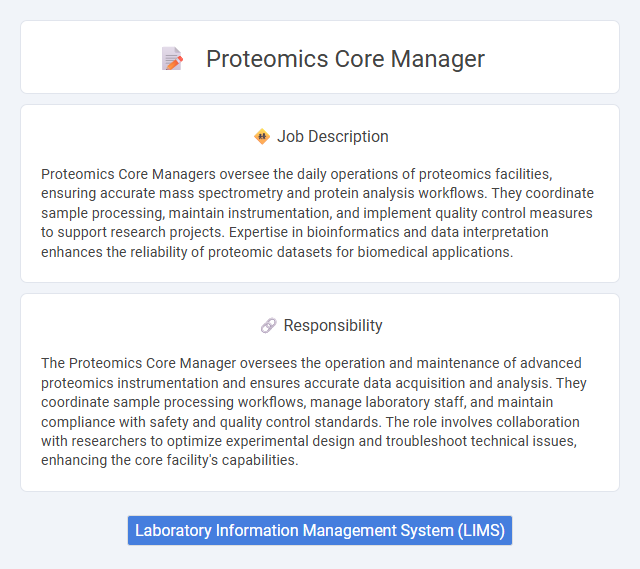
Proteomics Core Managers oversee the daily operations of proteomics facilities, ensuring accurate mass spectrometry and protein analysis workflows. They coordinate sample processing, maintain instrumentation, and implement quality control measures to support research projects. Expertise in bioinformatics and data interpretation enhances the reliability of proteomic datasets for biomedical applications.
Candidates with strong analytical skills and a background in molecular biology or biochemistry are likely suitable for the Proteomics Core Manager position. Individuals who can manage complex laboratory workflows and lead a team while maintaining precision will probably excel in this role. Those uncomfortable with high-pressure environments or unfamiliar with proteomics technologies might find this position challenging.
Qualification
A Proteomics Core Manager requires advanced expertise in mass spectrometry, protein chemistry, and bioinformatics, typically supported by a PhD in biochemistry, molecular biology, or a related field. Proven experience in managing a high-throughput proteomics core facility, including instrument maintenance, method development, and data analysis workflows, is essential. Strong leadership skills and the ability to collaborate with multidisciplinary research teams enhance operational efficiency and scientific output quality.
Responsibility
The Proteomics Core Manager oversees the operation and maintenance of advanced proteomics instrumentation and ensures accurate data acquisition and analysis. They coordinate sample processing workflows, manage laboratory staff, and maintain compliance with safety and quality control standards. The role involves collaboration with researchers to optimize experimental design and troubleshoot technical issues, enhancing the core facility's capabilities.
Benefit
A Proteomics Core Manager likely offers significant benefits including access to cutting-edge proteomics technology and collaboration with leading researchers. The role probably provides opportunities for professional growth through managing core facilities and advancing expertise in protein analysis. Employees might also enjoy a dynamic research environment with potential for meaningful contributions to scientific discoveries.
Challenge
Managing a Proteomics Core likely involves navigating complex technical challenges related to high-throughput data analysis and instrument maintenance. There is a probability that the manager must address evolving research demands while ensuring accuracy and reproducibility across diverse projects. Balancing resource allocation and staff training may also present ongoing difficulties in maintaining optimal core facility performance.
Career Advancement
Proteomics Core Manager positions offer substantial career advancement opportunities through leadership in cutting-edge protein analysis technologies and project management. Mastery in mass spectrometry and bioinformatics enhances expertise, enabling progression to senior scientific roles or strategic oversight within biotechnology and pharmaceutical industries. Developing skills in team coordination and instrument optimization positions professionals for roles in research development and operational management.
Key Terms
Laboratory Information Management System (LIMS)
Proteomics Core Managers oversee high-throughput proteomic workflows while ensuring accurate data management through advanced Laboratory Information Management Systems (LIMS). They optimize sample tracking, data integration, and instrument calibration within LIMS to enhance experimental reproducibility and streamline core facility operations. Expertise in LIMS customization supports efficient project management, quality control, and compliance with data standards in proteomic research.
 kuljobs.com
kuljobs.com